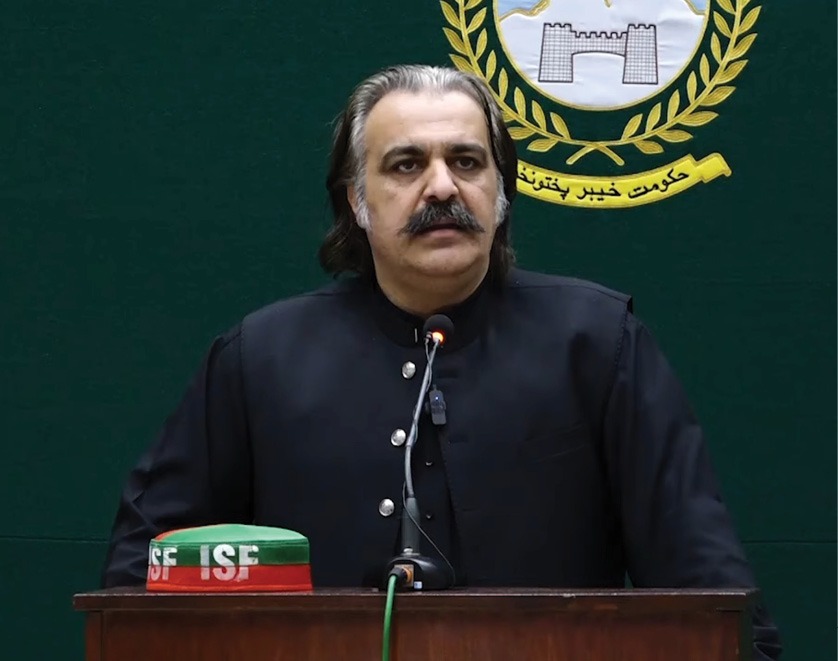Handwritten Resignation to Be Sent Again
Former Chief Minister of Khyber Pakhtunkhwa, Ali Amin Gandapur, has decided to resubmit his resignation to the provincial governor. This time, however, he has personally written it by hand, aiming to eliminate any possible legal ambiguities related to the document’s authenticity.
According to sources within the Pakistan Tehreek-e-Insaf (PTI), Gandapur finalized his handwritten resignation after stepping down from his position earlier this week. Party insiders said that the decision to handwrite the letter was taken “as a precautionary measure” to avoid disputes that may arise over a computer-typed resignation.
The new letter is expected to be officially dispatched to the Governor of Khyber Pakhtunkhwa later today.
A Move to Prevent Legal Disputes
Political observers note that handwritten resignations carry greater weight in Pakistan’s legal and administrative system. In several past cases, resignations typed or submitted electronically were challenged over authenticity or intent.
A PTI source explained that by writing the resignation himself, Gandapur aims to make it “legally watertight,” preventing anyone from questioning whether the document was genuinely issued by him. The step comes amid a period of heightened political sensitivity in the province, where power transitions are closely scrutinized.
Background: Gandapur’s Earlier Resignation
Ali Amin Gandapur, a senior PTI politician and former federal minister, had announced his resignation as Chief Minister only a few days ago. A related report, Political Shake-up in Khyber Pakhtunkhwa: Ali Amin Gandapur Resigns, PTI Names Sohail Afridi as New Chief Minister, provides further details about the leadership transition within PTI. His decision reportedly followed internal party consultations and growing political uncertainty in Khyber Pakhtunkhwa.
While his resignation had been submitted previously, sources suggest that it was not accepted formally due to procedural questions about its format and authenticity. The new handwritten version is intended to close that chapter and make the resignation official beyond dispute.
Party Confirms Decision and Consultations
Close circles within PTI have confirmed that Gandapur remains firm in his decision to step down. They said that the former chief minister made the move after careful deliberation and consultation with senior party leaders.
“Ali Amin Gandapur has written his resignation himself this time to ensure clarity,” one party insider said. “He wants the process to be transparent and free from any technical objections.”
PTI officials have not yet released an official statement regarding the party’s next steps in the province or who might replace Gandapur if the governor accepts his resignation.
Context: Political Uncertainty in Khyber Pakhtunkhwa
Khyber Pakhtunkhwa, a province often at the center of Pakistan’s political turbulence, has experienced frequent changes in leadership in recent years. The PTI, which remains a dominant political force in the region, has faced ongoing challenges amid national-level political instability and shifting alliances.
Ali Amin Gandapur’s resignation adds another layer to this uncertainty. Analysts believe it could affect PTI’s internal dynamics, especially as the party navigates leadership transitions and prepares for future electoral contests.
Gandapur, known for his outspoken political style and strong grassroots following, served as Chief Minister for a brief but eventful tenure. His decision to step down—especially through a carefully worded handwritten note—reflects his intent to leave office in a manner that is both legally sound and politically deliberate.
Next Steps
Once the handwritten resignation reaches the Governor’s House, it will be reviewed for verification and acceptance. Under Pakistan’s constitutional framework, a chief minister’s resignation becomes effective only after the governor formally acknowledges and accepts it.
If accepted, an acting chief minister will likely be appointed until a new leader is chosen through the provincial assembly.
The development underscores the ongoing volatility in Pakistan’s provincial politics, where leadership changes often intertwine with broader national debates about governance, accountability, and party discipline.















